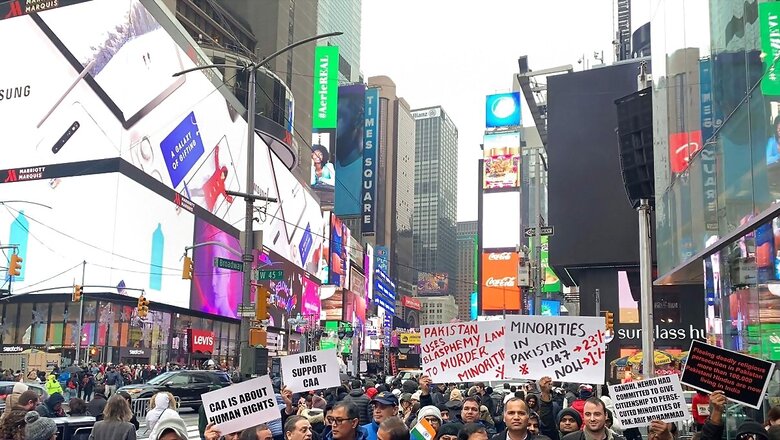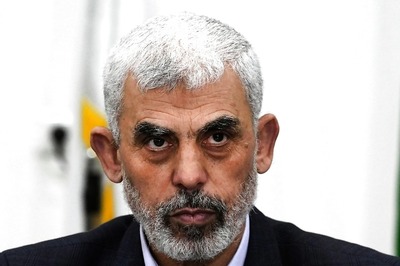
views
The Narendra Modi government on March 11 notified the implementation of the Citizenship Amendment Act. The act, since it was passed in December 2019, has seen widespread protests in different parts of the country. Political parties from the Opposition bloc have come out in the open against the act, calling it “unconstitutional and discriminatory”. At least three Opposition-ruled states—West Bengal, Tamil Nadu and Kerala—have refused to implement the CAA even as the debate around the act heats up.
In this article, I aim to deal with two separate questions-
- Is it constitutionally permissible for states to refuse to implement CAA?
- Does the act violate Article 14 of the Constitution, as claimed by its detractors?
The CAA has been implemented under the Seventh Schedule of the Indian Constitution which delineates the division of power between the Centre and the state on various subjects. Citizenship, under the Seventh Schedule, is exclusively the part of Union List, giving the parliament authority on the matter of citizenship, while leaving state governments with little power on the specific subject.
Besides, Article 11 of the Indian Constitution confers upon parliament the power concerning the acquisition and termination of citizenship and all other matters relating to citizenship. The framers of the Constitution were clear that the Parliament should be the sole authority to decide who is to be included within the ambit of the citizenship laws.
During the Constituent Assembly debate on August 10, 1949, regarding Articles 5 and 6, Dr B R Ambedkar, the chairman of the Constitution drafting committee, stated, “This Article refers to, citizenship not in any general sense but to citizenship on the date of commencement of this Constitution. It is not the object of this particular Article to lay down a permanent law of citizenship for the country. The business of laying down a permanent law of citizenship has been left to Parliament, and as members will see from the wording of Article 6 (now Article 11) as I have moved, the entire matter regarding citizenship has been left to Parliament to determine by any law it may deem fit”.
He categorically said, “If there is any category of people who are left out by the provisions contained in this (citizenship) amendment, we have given power to Parliament subsequently to make provision for them”.
Therefore, the parliament has the constitutional mandate to make amendments to the citizenship law as it deems necessary, and state governments are constitutionally obligated to implement the CAA.
The second question pertains to the constitutionality of the act, which many claim is violative of Article 14 of the Indian Constitution.
Article 14 states that “the State shall not deny to any person equality before the law or the equal protection of the laws within the territory of India.” It essentially means that any action taken by the state that discriminates between individuals is considered void, as it violates the fundamental right guaranteed under the article.
It is important to note that Article 14 has two dimensions – equality before the law and equal protection before the law. As Justice Subba Rao (in the case of State of UP v. Deoman Upadhyaya 1960) observed, Article 14 comprises both “positive content” as well as “negative content”. Whereas, equality before the law is a negative content, equal protection of the laws exhibits a positive content of Article 14.
The fundamental question arises as two equal persons can’t be treated unequally, can two unequal persons be treated equally? Will that not amount to a violation of the principle of equality? It is this question that is at the root of the ongoing debate.
There are several Supreme Court judgements that talk about the classification or differentiation of individuals (an exception to Article 14) if it is not ‘arbitrary, artificial or evasive’ and based on the reasonable ground of differentiation, known as the doctrine of reasonable classification.
In State of West Bengal v. Anwar Ali Sarkar, 1952, the Supreme Court laid down the twin test for reasonable classification. The court ruled that for the classification to be valid, it must meet two conditions-
- Classification must be founded on an intelligible differentia which distinguishes those that are grouped together from others.
- The differentia must have a rational relation to the object sought to be achieved by the Act.
In Ram Krishna Dalmia v. Justice Tendolkar, 1958, the court held, “It is now well established that while Article 14 forbids class legislation, it does not forbid reasonable classification for the purposes of legislation.”
There are about 250 petitions challenging the provisions of the CAA that are pending before the Supreme Court. The pivot of these petitions is the act’s presumed violation of Article 14. The act will have to pass the twin test of intelligible differentia and reasonable nexus to withstand the scrutiny under Article 14.
Those protesting against the implementation of the act argue that by excluding Muslims from the list of beneficiaries under the CAA, the government has violated the right to equality and secularism, fundamental ideals enshrined in the Constitution. However, the entire rhetoric is marred with factual inaccuracies as the act meets the twin test criteria laid down in Article 14.
Intelligible Differentia
The act seeks to make a distinction between two groups: one comprising Hindu, Sikh, Buddhist, Jain, Parsi, and Christian communities, and the other comprising Muslims from three neighbouring countries – Pakistan, Bangladesh, and Afghanistan. The act includes only three countries where Islam is the official state religion and the mentioned communities form minority groups facing religious persecution, making the differentiation reasonable on humanitarian grounds. It’s a no-brainer that Muslims living in these countries cannot be equated with the minority communities who have faced severe persecution for their religious beliefs.
Reasonable Nexus
The statement of object and reasons of the act states that – “It is a historical fact that trans-border migration of population has been happening continuously between the territories of India and the areas presently comprised in Pakistan, Afghanistan and Bangladesh. Millions of citizens of undivided India belonging to various faiths were staying in the said areas of Pakistan and Bangladesh when India was partitioned in 1947. The constitutions of Pakistan, Afghanistan and Bangladesh provide for a specific state religion. As a result, many persons belonging to Hindu, Sikh, Buddhist, Jain, Parsi and Christian communities have faced persecution on grounds of religion in those countries. Some of them also have fears about such persecution in their day-to-day life where the right to practice, profess and propagate their religion has been obstructed and restricted. Many such persons have fled to India to seek shelter and continued to stay in India even if their travel documents have expired or they have incomplete or no documents”.
The act aims to safeguard such individuals who may not have complete or any documents and are therefore ineligible to apply for Indian citizenship under Sections 5 or 6 of the Citizenship Act. The act simply “grants immunity” to the individuals belonging to specified communities, while expediting the process of acquiring citizenship for them.
It is important to note that the act does not impose any form of restriction on individuals belonging to the Muslim community from applying for Indian citizenship. Contrary to what is being propagated, under the new act, the status of foreign Muslims remains unchanged as it does not entail any provision classifying them as illegal migrants. As stated by the Ministry of Home Affairs, there is no prohibition on Muslims from any country seeking Indian citizenship under Section 6 of the Citizenship Act, which deals with citizenship by naturalisation.
Questions are also being raised about the government’s decision to include minorities from only three countries where Hindus are a minority. Another argument that has become central to the anti-CAA narrative is the government’s alleged disregard for the atrocities committed against certain groups within the Muslim community, such as Shias, Hazaras and Ahmediyas, in these three countries.
These arguments lack seriousness and seem to be driven by unrealistic liberal ideas without any basis in pragmatism. In response to such preposterous questions, Harish Salve wrote, “If the law was broader and allowed members of all religious communities from Pakistan, Bangladesh, and Afghanistan to migrate into India, we could as well do away with our borders.”
Let’s remember that CAA is a long-awaited state intervention to redress historical injustices. Our national commitment to this cause must not be overshadowed by a misguided notion of secularism.
Abhijeet Sriwastava is the Head of Policy Research of Bihar BJP. Views expressed in the above piece are personal and solely those of the author. They do not necessarily reflect News18’s views.


















Comments
0 comment